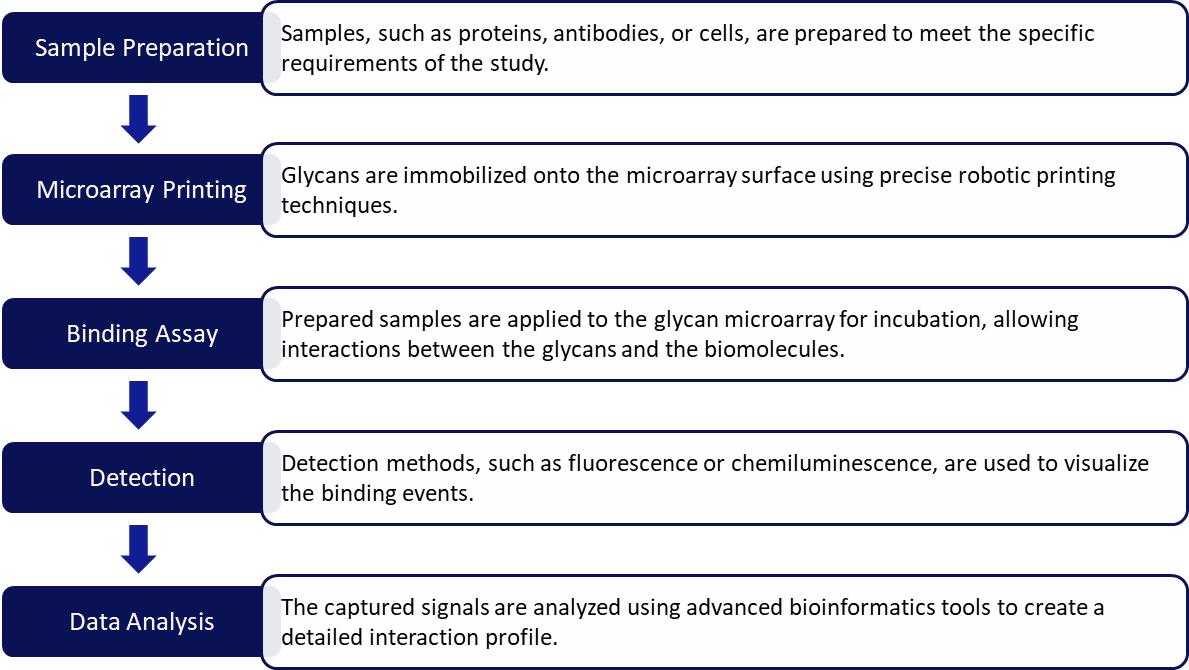What is Glycoengineering Microarray?
Glycoengineering microarray is a cutting-edge technology that facilitates the high-throughput analysis of glycan structures and interactions. Glycans, complex carbohydrates attached to proteins and lipids, play critical roles in numerous biological processes, including cell signaling, immune response, and disease pathogenesis. Understanding glycan interactions is pivotal for developing targeted therapies and diagnostics. Glycoengineering microarrays enable researchers to study these interactions systematically, providing insights that are essential for advancing biomedical research and therapeutic development.
Principle of Glycoengineering Microarray
The principle behind glycoengineering microarrays involves immobilizing a diverse array of glycan structures onto a solid surface, typically a glass slide or a silicon chip. These immobilized glycans serve as probes to interact with various biomolecules, such as proteins, antibodies, or cells, introduced during the assay. The binding events between the glycans and the biomolecules are then detected and quantified using various detection methods, including fluorescence, chemiluminescence, or mass spectrometry. This high-throughput approach allows for the simultaneous analysis of thousands of glycan-biomolecule interactions, providing a comprehensive glycan interaction profile.
Glycoengineering Microarray Assay Platform Offered by Creative Proteomics
Custom Glycan Microarray Design and Production
- Custom Glycan Synthesis: We offer custom synthesis of specific glycans tailored to your research needs, including natural, synthetic, and chemically modified glycans.
- Microarray Printing: Our advanced robotic printing technology ensures precise immobilization of glycans onto microarray surfaces, providing high-density and high-quality arrays.
- Library Diversity: Access to an extensive library of glycans, allowing for comprehensive profiling of glycan interactions.
High-Throughput Glycan Interaction Analysis
- Binding Assays: We provide high-throughput binding assays to investigate interactions between glycans and various biomolecules, such as proteins, antibodies, and cells.
- Detection Methods: Utilization of sensitive detection methods, including fluorescence, chemiluminescence, and mass spectrometry, to ensure accurate measurement of binding events.
- Data Analysis: Advanced bioinformatics tools for detailed analysis of binding data, revealing binding affinities and specificities.
Glycan Structure-Function Studies
- Functional Analysis: Investigation of the functional roles of specific glycans in biological processes, using customized microarrays.
- Mutational Analysis: Analysis of the effects of glycan modifications and mutations on biological activity and interactions.
- Pathway Analysis: Mapping glycan-mediated signaling pathways and their implications in health and disease.
Biomarker Discovery and Validation
- Biomarker Identification: High-throughput screening to identify potential glycan biomarkers associated with diseases.
- Validation Studies: Comprehensive validation of identified biomarkers using independent sample sets and advanced analytical techniques.
- Clinical Relevance: Evaluation of the clinical relevance and potential diagnostic value of identified biomarkers.
Glycan Profiling and Quantification
- Glycan Profiling: Detailed profiling of glycan structures in biological samples, providing insights into glycosylation patterns and changes.
- Quantitative Analysis: Accurate quantification of glycan levels using advanced analytical methods.
- Comparative Studies: Comparative analysis of glycan profiles between different sample groups, such as healthy vs. diseased states.
Advantages of Our Glycoengineering Microarray Platform
High Throughput and Efficiency
Our platform allows for the simultaneous analysis of thousands of glycan interactions, significantly accelerating research timelines. Automated processes, including robotic printing and automated detection systems, enhance efficiency and minimize the risk of human error. This makes large-scale studies feasible and cost-effective, reducing per-sample costs.
Sensitivity and Specificity
We use advanced detection methods such as fluorescence, chemiluminescence, and mass spectrometry, providing exceptional sensitivity and specificity. High-affinity probes ensure precise binding and accurate interaction profiling. This allows for the detection of low-abundance interactions that might be missed by less sensitive methods, ensuring reliable and reproducible data.
Comprehensive Glycan Libraries
Creative Proteomics provides access to an extensive library of glycans, including natural, synthetic, and chemically modified variants. This comprehensive library enables the exploration of a wide range of glycan interactions. Our custom glycan synthesis services allow for the creation of specific glycans tailored to unique research needs, providing broad coverage and the ability to conduct targeted studies.
Versatility and Flexibility
Our platform supports a wide range of applications, from biomarker discovery and drug development to vaccine research and disease mechanism studies. Flexible assay designs can be customized to meet the unique requirements of different research projects. This versatility ensures that the platform can be utilized for multiple research goals.
Expert Support and Consultation
We provide comprehensive support from our team of experienced scientists and technical experts, spanning the entire research process from experimental design to data analysis and interpretation. Expert guidance helps optimize study design and execution, enhancing the quality of the research and ensuring robust, reliable data.
Robust Data Analysis
Our platform features advanced bioinformatics tools for detailed data analysis and visualization. These tools allow for in-depth analysis of binding data, revealing binding affinities and specificities. This supports informed decision-making in research and development, leading to actionable and meaningful results.
High Reproducibility
We ensure high reproducibility through stringent quality control measures and standardized protocols. These measures guarantee consistency and reliability in the results, making it possible to replicate findings with confidence. Consistent and reliable data builds trust in research findings and ensures that subsequent studies and applications are based on solid evidence.

Sample Requirements for Glycoengineering Microarray
| Sample Type | Recommended Volume | Additional Notes |
|---|---|---|
| Proteins | 50-100 µg | Purity > 95%, free from interfering substances |
| Antibodies | 20-50 µg | Monoclonal or polyclonal, high affinity |
| Cells | 1-5 million cells | Viability > 90%, suspended in appropriate buffer |
| Serum/Plasma | 50-100 µL | Collected in anticoagulant-free tubes |
| Tissue Lysates | 100-200 µg | Homogenized in suitable lysis buffer |
Applications of Glycoengineering Microarray
Biological Pathway Mapping: Mapping glycan-mediated signaling pathways to understand their roles in health and disease.
Biomarker Discovery: Identifying glycan biomarkers associated with diseases for diagnostic and prognostic purposes.
Drug Development: Assessing glycan interactions for targeted therapy development and drug efficacy studies.
Vaccine Development: Studying glycan-protein interactions for vaccine design and development.
Glycan Structure-Function Studies: Investigating the functional roles of specific glycans in biological processes.
Comparative Glycan Profiling: Comparing glycan profiles in healthy vs. diseased states to uncover disease-related changes.
Personalized Medicine: Tailoring treatments based on individual glycan profiles for personalized healthcare strategies.
Biochemical Research: Conducting detailed analyses of glycan interactions with proteins, antibodies, and cells for fundamental biological research.




